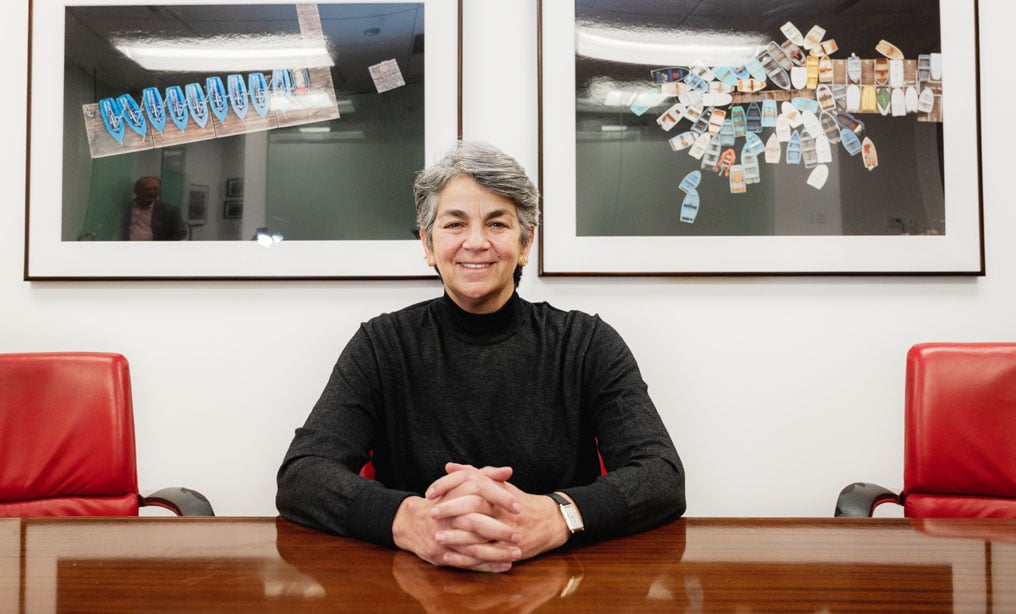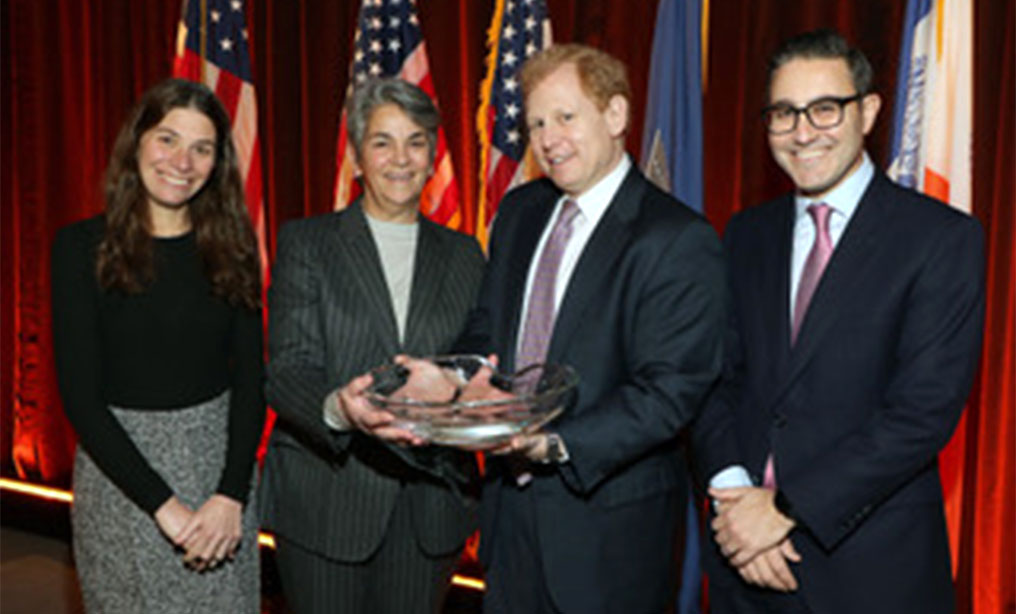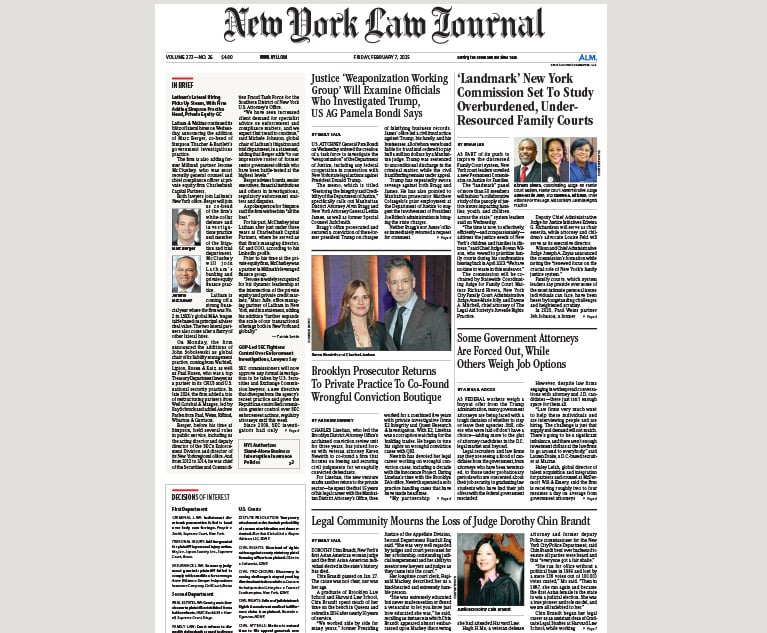No Stranger to Unpopular Cases, Kirshner Honored With Award From NY Defense Bar
Kirshner is now once again defending one of the highest-profile clients of her career—Robert Hadden, the former Columbia University obstetrician accused of sexual abuse against dozens of patients, including Evelyn Yang, the wife of former presidential candidate Andrew Yang.
March 12, 2020 at 12:21 PM
10 minute read
 Isabelle Kirshner, partner at Clayman & Rosenberg, in her office at 305 Madison Ave. Photo: Ryland West/NYLJ
Isabelle Kirshner, partner at Clayman & Rosenberg, in her office at 305 Madison Ave. Photo: Ryland West/NYLJ
Isabelle Kirshner's Midtown office gives few clues that it belongs to one of the most well-respected white-collar defense lawyers in the city.
It's small, and the view from Clayman & Rosenberg's sixth-floor suite lacks glamour. Kirshner can see the side of Grand Central Terminal, but only if she leans the right way.
But she can also see dozens of pictures — of her wife and their two dogs and great-nieces and nephews — and mementos of colleagues past and present.
A monocolor painting by firm co-founder and chairman Chuck Clayman hangs on one wall, while a letter on U.S. Supreme Court stationery — from Associate Justice Sonia Sotomayor, who worked with Kirshner in the Manhattan District Attorney's Office in the 1980s — is framed on the other side.
Sotomayor wrote to congratulate Kirshner on winning the 2018 Gideon's Promise Equalizer Award, which recognizes lawyers committed to equal access to justice.
Another award—this one from the New York Council of Defense Lawyers, which held a luncheon for Kirshner this month—was still sitting on the floor the day after she received it. The Norman S. Ostrow Award took the form of a giant crystal bowl in an even bigger turquoise box from Tiffany & Co., and while she was honored by the award itself, Kirshner isn't sure what to do with the bowl. Maybe serve spaghetti, or keep the whole office stocked with candy, she jokes.
Collegiality is a focus at Clayman & Rosenberg, and Kirshner said it's a big part of why she chose to move to the firm from a solo practice in 2004.
"Working with people who we like, and people who are not blowhards and stuff like that, is an important part of what makes this firm unique," she said. "And you know, we've interviewed people who were really smart and had great credentials and would be great lawyers, but they were jerks, and we weren't interested in having them around us."
The firm recognizes that everyone has a family and deserves to spend quality time outside of work, Kirshner said. She rarely works weekends, instead heading to her home in Dutchess County to spend time outdoors. She gets a bit of fresh air during the week, too, by commuting on a Citi Bike to and from her Union Square apartment. (She was biking well before the fear of coronavirus sent people out of the subways, she points out.)
Clayman said he thinks balance creates better lawyers, not to mention better people.
"If you get too into it, too stressed, too crazed, it doesn't work," he said. "But on the other hand, in the E&Y case, [Kirshner and her team] worked every day for six months."
Kirshner said she sees her defense in the tax-shelter case involving former Ernst & Young tax attorneys as one of the most important cases of her career. Her client was convicted at trial, but the case was reversed and dismissed at the appellate level.
She made a substantive argument in her motion for a judgment of acquittal, she said, and she was gratified to see that the appellate court used her argument nearly "verbatim" in the reversal.
"I think that was a case where there were a lot of other lawyers in the courtroom who watched me perform, there was a lot of press in the courtroom," she said. "And I think for me personally, it was an opportunity to see what I could do."
Kirshner is now once again defending one of the highest-profile clients of her career—Robert Hadden, the former Columbia University obstetrician accused of sexual abuse against dozens of patients, including Evelyn Yang, the wife of former presidential candidate Andrew Yang.
Hadden was first arrested in 2012, and the case ended with a plea deal much maligned by victims' advocates. Hadden gave up his medical license but received no prison time, and prosecutors in the office of Manhattan District Attorney Cyrus Vance Jr. pledged not to pursue crimes known to the office in 2016.
Kirshner attracted some criticism for donating to Vance's reelection campaign while the case was pending, though she argued that she and her firm simply supported Vance because he was the most qualified candidate. She and Vance have a long history, dating back to when they were young prosecutors together in the office of then-District Attorney Robert Morgenthau.
In February 2020, about a month after Yang's public accusation brought the case back into headlines, Vance's office confirmed that it was once again investigating Hadden. Kirshner, who had not been involved with Hadden's civil defense, is back on the job for the new criminal case.
"This was a case that was resolved six years ago, and it should remain resolved," she said. "It's done and over and I know there was sort of a hue and cry about it, but that's kind of where we are. It's going to get reevaluated, and I'm going to do my very best to keep him from getting charged again, and I hope I can do that."
She said Vance's statement after the guilty verdict in former Hollywood producer Harvey Weinstein's case, in which the top prosecutor praised the courage of women who accuse powerful men, showed that Vance has had "an epiphany" in how he views this kind of case.
Is it important that the men facing high-profile accusations of sexual misconduct hire lawyers who are women? Weinstein's lawyer, Donna Rotunno, has specifically cited her gender as an advantage, saying that juries are less likely to see female lawyers as bullies when they cross-examine victims.
Kirshner didn't go that far.
"I think it's important that [Hadden's] lawyer be really skilled and really hardworking, and really familiar with the case, and familiar with what has gone on in the past there," she said. "I think that's what's really important. I happen to be a woman."
Kirshner is no stranger to defending unpopular cases. In an interview, she spoke at length about her work as a Criminal Justice Act Panel lawyer in the 1990s and early 2000s, when she was assigned to several death penalty-eligible cases. She never had a capital case go to trial, she said, probably because much of her work was during the Clinton administration.
Through all of that, she approached the clients as individuals.
"As I used to say to people, it had nothing to do with the crimes that they were charged with. Some of them I liked and some of them I didn't like, in very much the same way as my own clients," she said.
She said developing a trusting relationship with her CJA clients was challenging, because they saw her and her government appointment as "part of the system that is oppressing them right now," but it helped her learn how to connect and adapt in ways that are still helpful in her white-collar work.
"People are people, and I think people react very differently to stressful situations," she said. "People come to us, you know, in what is presumably kinda the worst experience of their lives, and there are some people who just don't wanna deal with it. So I have to chase after them to get involved. … And then there are people who are very hysterical and very hands-on and want to come every day, want to talk to you every single day and send you 40-page emails every day."
No client exists in a vacuum, she said, and sometimes involving their families is part of the job, too. She quoted Clayman, saying that he calls good defense lawyers "merchants of hope," who find a way to be honest with clients while keeping them from becoming despondent.
Is there any category of cases she wouldn't take on? Kirshner, who has been vocal in her opposition to President Donald Trump, said she respects friends who've taken on cases involving the administration, but she draws the line at "certain political clients."
"It's not necessarily the crime so much as the client," she said. "I have some very strong political views, particularly about this administration, and I think it would be very hard for me to put aside those very strong feelings and properly represent a client."
She expanded on her views of Trump in her Ostrow Award acceptance speech, praising her fellow defense lawyers who work for immigrants' rights, clemency petitions and gender equality. She ended the speech with a call to arms.
 New York Council of Defense Lawyers' 2020 Ostrow Award Luncheon on Wednesday, March 4, where Isabelle Kirshner received the Ostrow Award for her work as a criminal defense lawyer. Pictured from left are: Jodi Misher Peikin, NYCDL treasurer and partner at Morvillo Abramowitz Grand Iason Anello; Kirshner; Jonathan Bach, NYCDL president and partner at Shapiro Arato Bach; Sean Hecker, NYCDL vice president and partner at Kaplan Hecker & Fink. Photo: Jack McCoy Photographs.
New York Council of Defense Lawyers' 2020 Ostrow Award Luncheon on Wednesday, March 4, where Isabelle Kirshner received the Ostrow Award for her work as a criminal defense lawyer. Pictured from left are: Jodi Misher Peikin, NYCDL treasurer and partner at Morvillo Abramowitz Grand Iason Anello; Kirshner; Jonathan Bach, NYCDL president and partner at Shapiro Arato Bach; Sean Hecker, NYCDL vice president and partner at Kaplan Hecker & Fink. Photo: Jack McCoy Photographs."We have about eight months until the November elections," she said to a crowded room at Cipriani 42nd Street. "We must unite and do whatever we can do to rid our country of the scourge that currently occupies the White House. He is an existential threat to our nation, our planet and our future."
Asked if she would ever run for elected office, Kirshner, 63, said the role of district attorney "seems like a fun job." But she won't run against Vance, and Vance has yet to say whether he'll run for another term.
At least in the current election cycle, she sees too many roadblocks: if Vance announced tomorrow that this is his final term, it's too late for her to start fundraising. She doesn't think she'd run unless she really thought she could win, and it's a crowded field already.
"I think it would be a great job," she said. "I think, as I said, I'm at a certain stage in my career in which I think, on many levels, I'm peaking in my abilities, but I also think it would be a great way to sorta ride into the sunset at some point."
If a woman is elected DA next year—several are already running—she would be the first to hold the role in Manhattan.
Over her decades in the law, Kirshner said she's been glad to see the "changing face" of the legal community and especially to see more women become defense lawyers.
"When I started this business, which was a long time ago, there were very few women who did this and there were certainly very few women who were sorta on the front line trying cases and dealing directly with clients," she said. "There's a lot now, particularly in the white-collar field."
This content has been archived. It is available through our partners, LexisNexis® and Bloomberg Law.
To view this content, please continue to their sites.
Not a Lexis Subscriber?
Subscribe Now
Not a Bloomberg Law Subscriber?
Subscribe Now
NOT FOR REPRINT
© 2025 ALM Global, LLC, All Rights Reserved. Request academic re-use from www.copyright.com. All other uses, submit a request to [email protected]. For more information visit Asset & Logo Licensing.
You Might Like
View All
Lawyers Across Political Spectrum Launch Public Interest Team to Litigate Against Antisemitism
4 minute read
'A Shock to the System’: Some Government Attorneys Are Forced Out, While Others Weigh Job Options
7 minute read
Haynes and Boone Expands in New York With 7-Lawyer Seward & Kissel Fund Finance, Securitization Team
3 minute readTrending Stories
- 1Parties’ Reservation of Rights Defeats Attempt to Enforce Settlement in Principle
- 2ACC CLO Survey Waves Warning Flags for Boards
- 3States Accuse Trump of Thwarting Court's Funding Restoration Order
- 4Microsoft Becomes Latest Tech Company to Face Claims of Stealing Marketing Commissions From Influencers
- 5Coral Gables Attorney Busted for Stalking Lawyer
Who Got The Work
J. Brugh Lower of Gibbons has entered an appearance for industrial equipment supplier Devco Corporation in a pending trademark infringement lawsuit. The suit, accusing the defendant of selling knock-off Graco products, was filed Dec. 18 in New Jersey District Court by Rivkin Radler on behalf of Graco Inc. and Graco Minnesota. The case, assigned to U.S. District Judge Zahid N. Quraishi, is 3:24-cv-11294, Graco Inc. et al v. Devco Corporation.
Who Got The Work
Rebecca Maller-Stein and Kent A. Yalowitz of Arnold & Porter Kaye Scholer have entered their appearances for Hanaco Venture Capital and its executives, Lior Prosor and David Frankel, in a pending securities lawsuit. The action, filed on Dec. 24 in New York Southern District Court by Zell, Aron & Co. on behalf of Goldeneye Advisors, accuses the defendants of negligently and fraudulently managing the plaintiff's $1 million investment. The case, assigned to U.S. District Judge Vernon S. Broderick, is 1:24-cv-09918, Goldeneye Advisors, LLC v. Hanaco Venture Capital, Ltd. et al.
Who Got The Work
Attorneys from A&O Shearman has stepped in as defense counsel for Toronto-Dominion Bank and other defendants in a pending securities class action. The suit, filed Dec. 11 in New York Southern District Court by Bleichmar Fonti & Auld, accuses the defendants of concealing the bank's 'pervasive' deficiencies in regards to its compliance with the Bank Secrecy Act and the quality of its anti-money laundering controls. The case, assigned to U.S. District Judge Arun Subramanian, is 1:24-cv-09445, Gonzalez v. The Toronto-Dominion Bank et al.
Who Got The Work
Crown Castle International, a Pennsylvania company providing shared communications infrastructure, has turned to Luke D. Wolf of Gordon Rees Scully Mansukhani to fend off a pending breach-of-contract lawsuit. The court action, filed Nov. 25 in Michigan Eastern District Court by Hooper Hathaway PC on behalf of The Town Residences LLC, accuses Crown Castle of failing to transfer approximately $30,000 in utility payments from T-Mobile in breach of a roof-top lease and assignment agreement. The case, assigned to U.S. District Judge Susan K. Declercq, is 2:24-cv-13131, The Town Residences LLC v. T-Mobile US, Inc. et al.
Who Got The Work
Wilfred P. Coronato and Daniel M. Schwartz of McCarter & English have stepped in as defense counsel to Electrolux Home Products Inc. in a pending product liability lawsuit. The court action, filed Nov. 26 in New York Eastern District Court by Poulos Lopiccolo PC and Nagel Rice LLP on behalf of David Stern, alleges that the defendant's refrigerators’ drawers and shelving repeatedly break and fall apart within months after purchase. The case, assigned to U.S. District Judge Joan M. Azrack, is 2:24-cv-08204, Stern v. Electrolux Home Products, Inc.
Featured Firms
Law Offices of Gary Martin Hays & Associates, P.C.
(470) 294-1674
Law Offices of Mark E. Salomone
(857) 444-6468
Smith & Hassler
(713) 739-1250







